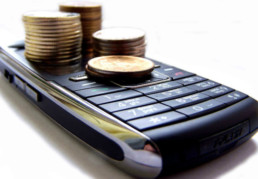Overview
Mobile money transfers have resulted in financial inclusion for the poor and unbanked in developing economies. Mobile handset infiltration in rural settings coupled with diverse use of mobile phones, improvement of Point of Sale devices and other new technologies have had positive impact on mobile transactions. In Ghana, there are three Mobile Money Operators namely MTN, Vodafone and AirtelTigo who partner with banks for an efficient transfer system.
Mobile Money popularly referred to as MoMo, in local parlance, is almost a decade old in Ghana and has become a common means of cash transfers, withdrawals and payments such as utilities, schools, airline tickets, top up credit, among other transactions through the use of a mobile telephone. The process is usually simple, fast and has low transfer charges. Accordingly, one can make transactions at any time with the utilization of technology to transfer money conveniently and efficiently.
According to the Bank of Ghana (BOG) as at September 2018 there were over 31 million mobile money accounts with a little over 12 million active accounts. The same report put registered agents at over 350, 000 with over GH¢190, 000 active agents. Additionally, mobile money transfers were close to GH¢160 million by the end of the third quarter of 2018 compared with GH¢ 109 million during the same period in 2017. BOG also recorded mobile money interoperability between May and September, 2018 at GH¢104.85 million and 1,118,315 in terms of volume.
Complaints
Mobile money transactions were mainly meant to make transactions within the mobile or online platforms rather than cash payments, which is becoming the norm. This has resulted in reported attacks and even murder of mobile money agents. Additionally, mobile money has come to be associated with a number of fraudulent activities leading to loss of money, stealing of passwords, etc.
Most often, criminals use a lot of strategies to defraud mobile money agents, consumers and financial service providers. These have included compassionate stories to engage and gain attention of patrons — The goal is to get a client to transfer money or gain access to the mobile money account. A summary of issues may include any of the following:
- A call or text to inform you that money has been mistakenly transferred to your account.
- A call or text to inform you that you have won a cash prize so you should send a token amount to receive it.
- A call from someone pretending to know you, mentioning names of your friends or colleagues and then offers a prize or a business opportunity. This information is mostly taken from your social media accounts.
- A call to teach you a shorter way to transfer money on the mobile money platform. By the end of the process you would have transferred money to the criminals.
- A call to tell you to enter your PIN to confirm a transaction to a bank account or your account.
- A call to inform you that the mobile provider needs your PIN.
- A call with story on how you can receive transfer if you adhere to some directions, which ultimately would involve cash transfer from your end.
- A call to inform you that a dear one or a close relative is in medical crisis and need funds to facilitate treatment.
Safety Tips
Below are a few safety tips to protect your account and how to avoid being defrauded:
- Never share your PIN as it is private and only for you. Change it immediately you think it’s been compromised or you have given it out.
- Never share your personal data or any account details with unauthorized persons or agents.
- Do take note that mobile money transfers confirm a name before transaction is finalised. As such it is almost impossible to transfer payment to a wrong account.
- Direct persons who claim to have sent money into your account to the mobile money network operator.
- Before leaving the mobile agent’s premises, ensure that you have received a text from an appropriate channel and it has the right amount.
- Always use a strong PIN, take the security of your PIN seriously and use one that you can easily remember. Avoid using date of birth or other personal information, as well as sequential figures like 1234, 5678, 3333, 4545, etc.
- Avoid greedy behavior in your day-to-day dealings; Any money you are not aware of or have not worked for is not yours.
- Do not give your phone to a mobile money agent to do a transaction on your behalf.
- Always end calls or ignore messages from unknown persons giving you a message that you are not familiar with.
- Verify calls and messages from your network. Messages always come from the official message link and not from a phone number.
- Remember you can only win a prize or items only if you have opted to be part. No one wins anything without being a participant.
- Confirm that transactions have the right name before approving.
- Call or visit the customer service office if you are in doubt and if possible use the official online portal to clarify an issue or make a complaint.
- Report to the Cyber Crime Unit of the Ghana Police Service. Educate yourself on mobile money transfer.
Security and Abuses in System
Mobile money transactions are sometimes undertaken without IDs or with fake IDs. Customers have engaged in mobile money transfers with SIM cards not registered in their names or purchased SIMS already registered making the SIM vulnerable and unsafe for users. Though there is a limit on number of transfers daily, patrons go around it by using different SIMS from agents, friends and relations.
Mobile money has become too cash centered instead of using it for online transactions. There is no limit of cash that customers can put in a mobile money account. Business operation areas of mobile money does not have any security infrastructure like financial institutions. Mobile money is currently not linked to bank accounts as such it has become a haven for criminals.
Concluding Thoughts
Mobile money has provided a medium to include all within the financial economy as well as job creation for those who offer various services within the value chain that includes mobile money agents, retailers and financial technology companies. Mobile money transfer has come to stay despite the challenges. Education is necessary to help address these. There must be a way to link mobile money account to bank accounts to augment the financial economy. Finally, it has become imperative to link identity cards for SIM registration to TIN Number or Social Security Number to help trace individuals and reduce the rate of mobile money offenders.
~By Ruby Tetteh





